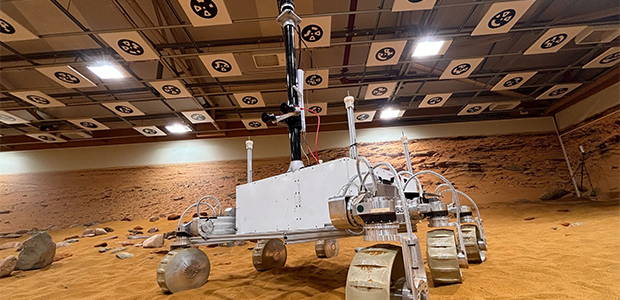
Opteran and Airbus join forces to show how nature can revolutionise space robotics
Opteran, a company focused on natural intelligence, has revealed that Airbus Defence and Space, with support from the European Space Agency (ESA) and the UK Space Agency, will trial its Opteran Mind neuromorphic software in Airbus’ space rovers.
Opteran’s approach, inspired by nature, offers a more efficient and resilient solution for autonomous space robotics, potentially unlocking new mission capabilities for future Mars expeditions and other space exploration ventures.
Rooted in over a decade of research into the visual and navigational abilities of animals and insects, Opteran is collaborating with Airbus to conduct tests at its Mars Yard. These tests aim to enhance rovers' depth perception in extreme off-world conditions.
Current space robots are slow and rely on multiple cameras to map their surroundings, a process that can take several minutes before each move. Opteran’s technology allows Mars rovers to process and understand their environment in milliseconds, even in harsh conditions, without significantly increasing power consumption. By reverse-engineering brain algorithms into software, Opteran enables autonomous machines to navigate difficult terrain with minimal data and training. If successful, this technology could transform off-world navigation, allowing rovers to travel farther and faster, with continuous operation in the harshest environments.
“We are delighted to be working with ESA and Airbus to demonstrate how Opteran’s neuromorphic software addresses key blockers in space autonomy,” said David Rajan, CEO and Co-Founder, Opteran. “Our long-term vision is to provide natural autonomy with the Opteran Mind to every machine, on Earth and beyond, and this project will show how we can enable high speed, continuous safe driving, optimised for the rigors of planetary rover navigation. Today, no such flight-ready systems exist, so there is a major opportunity for Opteran to step up and resolve a challenge facing all the major players in space robotics.”
This project is funded by ESA’s General Support Technology Programme (GSTP) through the UK Space Agency, which takes leading-edge technologies that are not ready to be sent into space and then develops them to be used in future missions. The near-term focus for the BNEE project is on depth estimation for obstacle detection, and the mid-term focus on infrastructure-free visual navigation. Once the results of the initial testing have been presented to ESA the goal would be to move to the next stage of grant funding which would start to focus on deployment and commercialisation.
For more startup news, check out the other articles on the website, and subscribe to the magazine for free. Listen to The Cereal Entrepreneur podcast for more interviews with entrepreneurs and big-hitters in the startup ecosystem.

